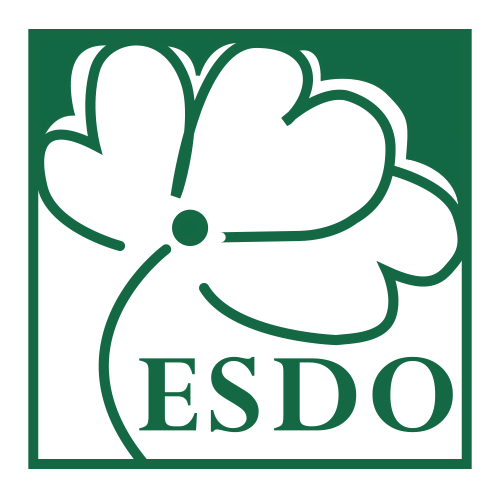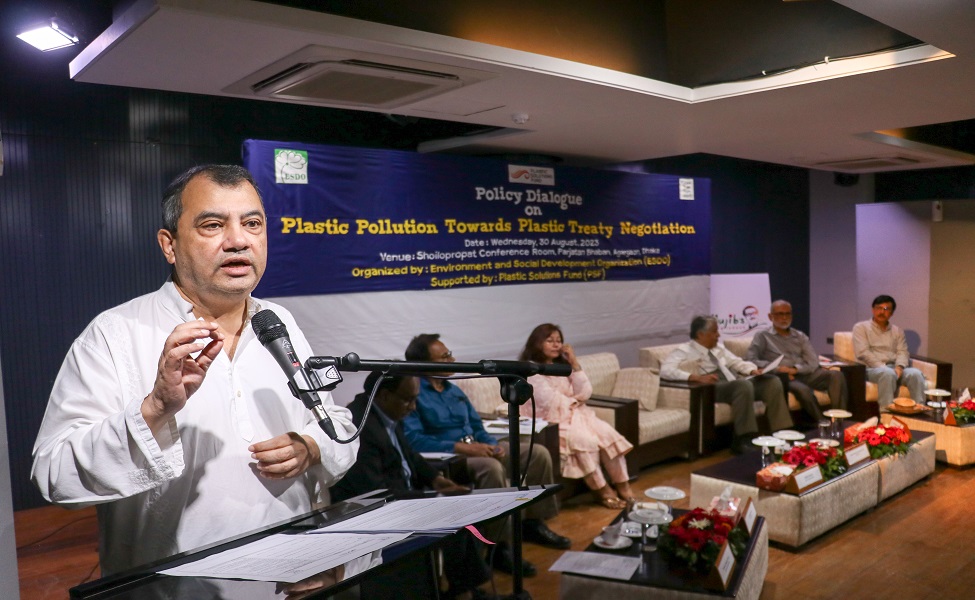Environmental activists and experts urge an immediate nationwide ban on single-use plastic with strict enforcement. Today, in Dhaka, Environment and Social Development Organization (ESDO) is hosting a policy dialogue on “Plastic Pollution Towards Plastic Treaty Negotiation.”
Saber Hossain Chowdhury MP, Chairman of the Standing Committee on the Ministry of Environment, Forests, and Climate Change, stated that plastic pollution is a vital problem for both humanity and the environment. Speaking as the chief guest, he addressed the audience. He said reducing plastic pollution requires collaboration between the government and the public, eventually leading to a global agreement. We really need to stop the use of single-use plastic as it contributes to climate change more.
Syed Marghub Murshed, the respected chairperson of ESDO and former Secretary of the Bangladesh Government chaired the policy dialogue. “It is quite alarming that Bangladesh is one of the most plastic-polluted nations in South Asia,” he stated. He said plastic exerts a significant influence on the environment. We’ve already put a stop to the use of polythene bags. Despite our efforts, plastic pollution remains a problem we cannot solve. To preserve our status as the first country to ban polythene bags globally, he added that we must act quickly to end plastic pollution in our nation.
According to the special guest of the event Dr. Mahfuzul Haque, Adjunct Faculty, Department of Sociology, BUP, Former Secretary, Government of People’s Republic of Bangladesh, “When each person makes environmentally conscious choices, it adds up to a significant positive impact on the environment. Small actions, like reducing single-use plastics, using alternative products, and choosing to refill, can collectively result in substantial changes.”
SK Rafiqul Islam, Chief Controller, Office of the Chief Controller of Imports & Exports, the Special Guest of the event, mentioned that the rivers of Bangladesh are a representation of the country’s scenic beauty since it is a riverine country. However, plastic pollution mostly contaminates these rivers. We need to stop plastic pollution at the source and properly segregate our waste at the source.
Bangladesh banned plastic bags two decades ago, but non-biodegradable items are still found in kitchens, public spaces, and upscale retail centers. Polythene bags are still being made, bought, and used in Bangladesh despite being banned in 2002. The government of Bangladesh has been sluggish in implementing this law to be advantageous. Last year, a study of ESDO revealed that Each day, 18 transboundary rivers in Bangladesh carry approximately 15,345 tons of single-use plastic waste of which 2802 tons originate from India and Myanmar. 2519 tons come from India and 284 tons from Myanmar. Approximately 2.6 million tons of single-use plastic waste enter our Bay of Bengal every year, of which nearly half a million tons are transboundary wastes.
In order to phase out single-use plastic items in 12 coastal districts (Bagerhat, Barguna, Bhola, Chattogram, Cox’s Bazar, Feni, Khulna, Lakkhipur, Noakhali, Patuakhali, Pirojpur, and Satkhira) and eight Chattogram neighborhoods over the course of three years, the government department launched the project in 2021. The Ministry of Environment, Forests, and Climate Change reportedly gave all parties concerned instructions to prohibit using single-use plastic totally from 12 coastal areas of Bangladesh by 2023, per an order from the High Court published in this gazette. Only four months remain in 2023 as of August 2023, yet the implementation process is moving very slowly.
The second session of the Intergovernmental Negotiating Committee (INC-2), which aimed to establish a legally binding international agreement on plastic pollution, has successfully concluded. Meetings leading up to INC-3 have already been scheduled to review the “zero draft” of the new treaty. By the end of 2024, UNEP’s plans anticipate the completion of the Intergovernmental Negotiation Committee Meetings (INC-5). The Global Plastic Convention will be adopted following the conclusion of INC-5. As Bangladesh is actively supporting and participating in the pact, that means we must prepare to sign the agreement and take swift action to eliminate plastic pollution in our country.
Dr. Shahriar Hossain, the Secretary General of ESDO, has stated that this plastic treaty has more meaning than just a piece of paper. He said, “Plastic waste is present in even the most isolated areas of our planet, suffocating marine life and littering beaches. It’s a worldwide issue that impacts every nation, group, and individual. Despite this disaster, the Global Plastic Treaty gives us hope.”
Md. Selim Reza, Chief Executive Officer and Additional Secretary of Dhaka North City Corporation joined the event as guest Speaker. He said, “Segregating plastic waste at its main source is the vital first step towards a cleaner future. By sorting today, we sow the seeds of sustainability, nurturing a world where plastic’s potential harm is curtailed. To make a greater positive change, we must act right now.”
Bangladesh Plastic Association’s President, Mr. Shamim Ahmed stated “The global demand for single-use plastics has risen significantly over the past few decades. However, the detrimental impact of single-use plastics on the environment has become increasingly evident, prompting a pressing need to shift towards more sustainable alternatives. Currently, several renowned super shops have taken a commendable step in addressing the issue of single-use plastics by embracing refill systems and moving away from traditional single-use plastic packaging.”
Also present at the event was Siddika Sultana, the Executive Director of ESDO. She said “ESDO has been engaged in advocating and campaigning against plastic pollution with various stakeholders. The network has empowered young people to become a global voice to end plastic pollution.”
Respected board members of ESDO, academicians from different renowned universities, representatives from the Ministry of Health, Ministry of Industry, Ministry of Commerce, Ministry of Food, Ministry of Agriculture, Ministry of Foreign Affairs, Ministry of Local Government, Ministry of Tourism BIWTA, NBR, Consumer FBCCI, JDPC, BELA, students and green club member of ESDO from Lalmatia Girls High School and College and Lalmatia Housing Society School and College along with media representatives actively participated at this policy dialog event.

